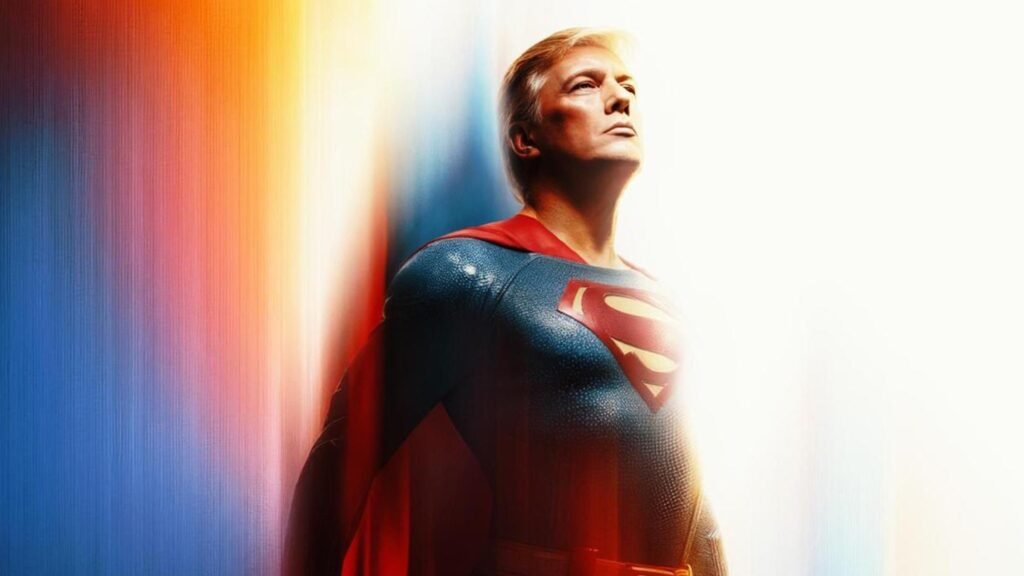Donald Trump: Super-POTUS? A Look at His Recent Superman Imagery and Political Context
In a vibrant fusion of pop culture and politics, Donald Trump recently found himself the subject of an eye-catching portrayal by the White House. Released amidst the buzz surrounding James Gunn’s new superhero movie, the White House shared a Photoshopped image of Trump donned in Superman’s iconic red and blue costume, dubbing him “Superman Trump” and a “SYMBOL OF HOPE.” This playful comparison comes at a time when the political climate is charged with debates over immigration, and it reflects Trump’s ongoing attempt to reshape his narrative in alignment with American ideals.
The provocative imagery comes at an interesting juncture, especially with immigration dominating the discussion surrounding Gunn’s film. The movie highlights themes of “human kindness,” a concept that resonates deeply amid current debates on how undocumented immigrants are treated in the U.S. By positioning Trump as a superhero, the White House is not only attempting to bolster his image but also adapting to the very narrative Hollywood is putting forth — that of empathy and acceptance. This juxtaposition raises eyebrows, particularly given Trump’s administration’s contentious history concerning immigration policies, which have drawn widespread protests across the nation.
Public reactions to the Washington’s social media antics have varied significantly, especially among Trump’s supporters, who often see such portrayals as a triumphant assertion of their values. However, critics argue that this playful imagery contradicts the administration’s track record on immigration, portraying Trump as an unintentional villain despite his portrayal as a protector in superhero garb. The notion of Trump as a defender of American values clashes sharply with the reality of law enforcement actions against undocumented immigrants, leading many to question how such a portrayal could gain traction among those truly affected by these policies.
Social media trends often reflect and shape public sentiment, and this recent move is part of a broader habit of injecting pop cultural references into political discourse. Just a few months prior, Trump’s administration had engaged followers with an AI-generated image of him in a “Star Wars” ensemble, wielding a red lightsaber. Here too, the imagery danced between humor and seriousness, showcasing the administration’s desire to remain culturally relevant. This balancing act attempts to align Trump’s image with the powerful narratives and characters that resonate with the American public, making him seem more relatable and in touch.
Looking deeper into the parallels drawn between Trump and characters from comic lore, we find an intriguing commentary on the nature of heroism. In comic books, characters like Lex Luthor challenge societal norms by wielding immense wealth and power. By painting Trump as a superhero, the White House seems to ignore the complex narratives that surround both villainy and heroism in popular media. This selective association showcases a desire to craft a favorable narrative, but it also raises important questions about authenticity and the implications of seeing a divisive political figure dressed in the robes of goodwill.
As the conversation around this Superman imagery continues to unfold, it serves as a reminder of the blurred lines between politics and pop culture. The efforts to crown Trump as a ‘Super-POTUS’ might resonate with some, but for many, it starkly contradicts the reality of the current socio-political landscape. Ultimately, whether Trump’s administration can successfully reinterpret his image through the lens of superhero symbolism will depend on the ongoing discussions around immigration, justice, and what it truly means to embody hope for the American people.
This intriguing play on the superhero narrative amplifies the fact that political identities are constantly shaped and reshaped through cultural symbols. As we navigate these representations, we must critically assess the messages being disseminated, ensuring that the true stories of real Americans are not overshadowed by their portrayal as characters in a political drama. In the face of challenges like immigration and human rights, it is crucial for all voices to be heard and for empathy to remain at the forefront of our national narrative.









